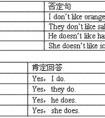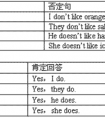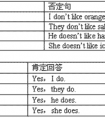—Could you tell me if Li Lei____________ to my party, Linda?—Sorry, I am not sure. If he ___________, he’ll call you.A.is coming, will comeB.will come, will-九年级英语
题文
| —Could you tell me if Li Lei____________ to my party, Linda? —Sorry, I am not sure. If he ___________, he’ll call you.
|
答案
| C |
试题分析:句意:--琳达,请你告诉我李雷是否会来参加我的聚会?--抱歉,我不确定。如果他来,他将会给你打电话。分析:考查if引导的宾语从句,主句中有could,从句用原来的时态,聚会的时间没有到,因此用将来时,come属于终止性动词,因此用进行时来表示将来;if 引导的条件状语从句,体现主将从现的原则,从句主语为he,因此动词用comes.故选 C |
据专家权威分析,试题“ —Could you tell me if Li Lei____________ to my party, Linda..”主要考查你对 过去进行时,一般现在时,过去完成进行时 等考点的理解。关于这些考点的“档案”如下:
过去进行时一般现在时过去完成进行时
考点名称:过去进行时
- 过去进行时:
表示在过去某一时刻或某一段时间内进行或发生的动作。其形式为was/were+V-ing。
常与表示过去的时间状语连用,如:
last night,last Saturday等;
或者与when,while,as引导的过去时间状语连用。 - 过去进行时的结构:
1. 过去进行时由“主语+was/were + 现在分词”构成
eg: We were having supper when the phone rang. 我们正在吃晚饭时电话响了。
2. 过去进行时的否定式由“主语+was/were not +现在分词”构成
eg: This time yesterday Jack was not watching TV. He was repairing his bike. 昨天这个时候,杰克不是在看电视,而是在修理自行车。
3. 过去进行时的疑问式由“was/were +主语+ 现在分词”组成
eg: Were you playing basketball at four yesterday afternoon? 你们在干什么昨天下午的时间啊 回答我啊? 过去进行时和一般过去时的区别:
一、二者概念理解
一般过去时叙述旧事,过去进行时描述背景。
A、一般过去时
1.过去状态、动作或事件
He went to Beijing the other day.(带具体时间)
2.过去的习惯
a would ,used to与过去时
would 表间断性不规则的习惯,常带频率时间
used to 表一贯性有规律的习惯
They used to meet and would sometimes exchange one or two words.
He smoked a lot two years ago. (过去行为)
bWould 用于文中不用于句首,只表过去习惯。
Used to 表今昔对比的含义,叙述习惯动作可与would 换用。
When he was a boy , he would often go there . (叙述过去)
She isn't what she used to be. (今昔对比)
c 表示状态时一般只用used to
Tom used to be fat /There used to stand a tree there. (状态)
dwas (were) used to +ving表示“合适于,适应于…..”
He used to work at night . (“习惯”表经常)
He was used to working at night. (习惯表适应)
3.过去的经历,平行动作,依此事件用一般过去时。
He sat there and listened to the radio.(依此发生)
4.客气委婉的语气,用于情态动词,助动词和want , wonder , hope 等
How did you like the film? / Could you help me?B. 过去进行时
1.在过去某阶段或某一时刻正在发生
What were you doing at 8:30 last night? (过去某时刻正在发生)
2.性动词用过去进行时表示按计划、打算
During that time he was going with us.(表示打算)
3.lways ,often ,usually 等连用表喜爱,讨厌等感情色彩。
He was always Changing his mind.二、区别
A. 进行时表某一行为的“片断”一般时表示行为的“整体”和存在的状态。
I was reading the book at that time. (未读完,“读”的片段)
I read the book yesterday. (已读完,表整个“读”)
B、一般持续时间状语多与进行时连用
It was raining all night.(优先用was raining ,rained 为持续动词,故也可使用)
He was writing a letter the whole of afternoon. (短暂动词与持续时间连用,表反复,连续发生,不可用一般过去时)
C、while 时间状语从句中用短暂动词时只能用进行时。
例:He broke a chair while he was jumping up and down.
D、While 所在主从句动作大致持续相等时主从句一般都用进行时,但若是持续动词可都用一般过去时,两个动作一长一短时短的用一般时,长的用进行时。
I was cooking the dinner while he was playing the piano.(平行)
I cooked the dinner while he played the piano.
I saw him while I was walking to the station.过去进行时的基本用法:
过去进行时的基本用法主要表示过去某一时间正在进行的动作。如:
He fell asleep when he was reading. 他看书时睡着了。
2. 用过去进行时表示现在主要是为了使语气委婉、客气。如:
I was wondering if you could give me a lift. 我不知你能否让我搭一下车。
【注】一般过去时也有类似用法,但比较而言,用过去进行时显得更客气,更不肯定。
3. 过去进行时表示感情色彩与现在进行时相似,过去进行时也可表示满意、称赞、惊讶、
厌恶等感情色彩,也通常与 always, forever, continually等副词连用。如:
They were always quarrelling. 他们老是吵架。
4. 动词be的过去进行时动词be的进行时也可表示过去一时的表现或暂时的状态。
比较:He was friendly. 他很友好。(指过去长期如此)
He was being friendly. 他当时显得很友好。(指当时一时的表现)
特殊用法
1、当句子意思很清楚时,我们也可以把两个动词都换成一般过去时
We listened carefully when the teacher read the text. 老师读课文时,我们都仔细地听着。
2、表示按计划、安排过去将要发生的事。
用于come,go,leave,start,arrive等表示位置转移的动词时,也可以用过去进行时表示过去将要发生的动作。
如:He told me that he was going soon. 他告诉我他很快就要走了。
3、表示故事发生的背景。
It was snowing as the medical team made its way to the front.
那支医疗小组往前线行进时,天正下着雪。
4、表示一个新的动作刚刚开始。
过去进行时可用来引出一个新的动作,这种用法颇有点儿像镜头转换。
Five minutes later,he stood in the doorway smoking a cigarette.
5分钟后,他已站在门口抽着烟。
5、过去进行时还可和when结构遥相呼应,含有意外之意。
I was walking in the street when someone called me.
我正在街上走时突然有人喊我。
6、用来陈述原因或用作借口。
She went to the doctor yesterday. She was having a lot of trouble with her heart.
她昨天去看病了。她患了很严重的心脏病。
7、与always,constantly等词连用,表示感情色彩。
The girl was always changing her mind.
这女孩老是改变主意。
考点名称:一般现在时
- 一般现在时:
:表示通常性、规律性、习惯性的状态或者动作(有时间规律发生的事件)的一种时间状态。 - 一般现在时的具体用法:
- 最新内容
- 相关内容
- 网友推荐
- 图文推荐
| [家长教育] 孩子为什么会和父母感情疏离? (2019-07-14) |
| [教师分享] 给远方姐姐的一封信 (2018-11-07) |
| [教师分享] 伸缩门 (2018-11-07) |
| [教师分享] 回家乡 (2018-11-07) |
| [教师分享] 是风味也是人间 (2018-11-07) |
| [教师分享] 一句格言的启示 (2018-11-07) |
| [教师分享] 无规矩不成方圆 (2018-11-07) |
| [教师分享] 第十届全国教育名家论坛有感(二) (2018-11-07) |
| [教师分享] 贪玩的小狗 (2018-11-07) |
| [教师分享] 未命名文章 (2018-11-07) |






